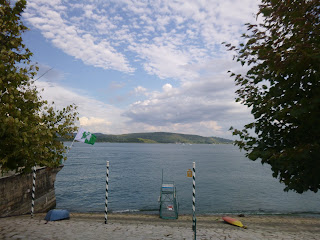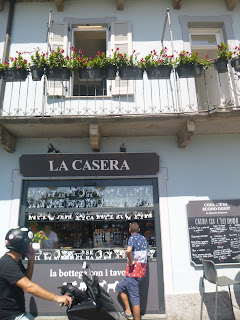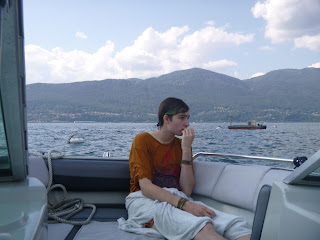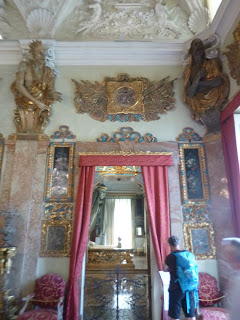We hadn’t seen Matteo and Fatima in four years, since we were in Sardinia.
That was a grand trip full of boat rides around magic islands, like L'Advventura.
No one disappeared in the Mediterranean, but something opened for all of us.
This time, Lake Maggiore was our destination, near Cuomo and Milano.
We arrive in Milan, grab a cab to the water, and sit for a second reveling in the moment, greeting Matteo and Fatima.
We’re a little older, but still here. Matteo and Fatima are still fabulous, trying to coordinate meeting spots, before we jump in the boat, crossing the water, through the stormy, bumpy waters, for a few days of swimming.
On arrival, Matteo dubbed Bear, Orsito.
Back at the house, we enjoyed pasta, al dente, cooked into pomodoro and garlic sauce, with ample glasses of red wine.
Bear and I chatted about Dharma Bums and Gary Snyer; Carolina and Fatima made leaf prints.
Matteo and Fatima are staying with the family at the family compound at Lake Maggiore.
We’ve all been buddies for years now, Matteo and I since our junior year in high school, when Matteo stayed with us as an exchange student from Italy.
And then I stayed with him in Milano for a few weeks back in August of 1991, in between summer and fall terms in Italy, zipping up and down the coast.
He visited me in California. We met in Paris a few times, London, Sardinia, etc.
But it had been a while.
Covid got in the way of our spring break trip to Thailand over spring break.
So it was quite a reunion.
We even got to see Matteo’s father Fabrizio, who I hadn’t seen since 1986, still gentle and friendly.
Over the next few days, we ate and drank too much, boating about, swimming, stopping for trips for culture to peruse the collections at the Palazzo Borromeo in Isola Bella and then seeing the Brera Pinacotecabrera Museum Art Collectionin Milano and the Borromean Island Galleries, giggling about the scrumptious, majestic, sometimes maniacal history of Italian, baby Jesus, looking at the painter as he suckles his mother’s boobs, tapestries of cats licking each others’ asses, St Sebastion sooo hot.
“Why is st sebastian so homoerotic?” wonders the little one.
As soon as you think you’ve mastered one layer, another follows.
Italy goes on and on
More giggling at the innuendo of the Italian masters, You mind a foot massage, we wondered looking at Hayez.
Angels capturing the blood of Christ from the crucifix.
What are they doing with all the blood in the goblets?
Allegory of Fortune...
Jesus with a choker.
The teenager says At Sebastian is a twink. I wanna take his paid away. And Jesus, while assigned male at birth, is probably trans, particularly given his mom's situation.
And painter, Sofonisba Anguissola, who opened new worlds. We loved exploring it all.
Matteo talks about his life in Italy and Thailand, the draw to home and then away.
Fatima talked about her work with refugees.
Fatima told me about her work and the conflicts which sometimes follow.
“I like the gentle friends in charity, with the same values as mine, non- cringy, those in with charity with the refugees,” she tells me. Although she met Matteo in Ibitza, she says, “I moved away from the party friends.”
Originally from Pakistan, she is the founder ofCreatives Against Poverty. Today she leads her work from Thailand, where she lives in a vibrant community of ex pats and counterculture types.
“We use craft and the sharing of traditional natural dye techniques as a community building exercise. We extract leaf pigment using discarded rusty metal bits, fermenting these into a formula which we use on pre loved fabric to create unique works of art.”
Still even there, conflict is part of the story.
“I wasn’t good at dialogue,” she told me. “I just pulled away.”
But she’s getting better at talking through things.
“You see a friend being sarcastic. You can see that wasn’t cool to use sarcasm. Sarcasm is pulling us down. Now, I find I side with those being pushed down. I can’t watch them being pushed down.”
Still, the violence continues, from Wyoming to Russia, to upstate New York, where an opponent of tolerance, stabbed Salmon Rushdie just last week, after years of the fatwa.
“Violence is a loss of control,” she says. “Its giving merit to the impulse to revenge. In Pakistan, we hope they can see the other side. We hope they can dream the anger out. That they can catch the brain washing and stop it. I worry about the intolerance. To change that, we have to find ways to play,” she says, reminding me of my work, but this a caveat, the play has to be “without competition. We need dance and play and comedy,” she says referring to the comedian preacher, Allah Made Me Funny. “We need to make stuff together. pottery and leaf projects. Sports scar. Riots follow.”
“We have conflicts over resources in Koh Phan Gan Thailand, so we call it community building, not conflict resolution. We let refugees be workers… with conflict, we don’t need to join the conflict. Instead we teach de escalation. We insert the idea in a systematic way, solve it in the school yard, not the street. I need to romance them, not call them out. I enjoy the state of laughter, trying to engage the powerful. The Myamars are the poorest workers. I can’t change that or go back on hundreds of centuries of history. The leaf printing is a way of engaging people. I hate it when people say we don’t have the resources. Leaf printing works. It's cheap and easy. It connects with gardening and a feeling of being with the earth. When others see this guy doing it, then the men working it. Suddenly, we’re not talking gender. We’re listening to each other, applying it to other things, trying to listen.”
The conversation goes on for days.
In between, the five of us laugh as much as we can, giggling about funny translations.
“Dick head” in Italian is “Teste de cazzo.”
But what is it in German? I ask Caroline, who doesn’t know.
“Dick Kopf,” says google.
Fuck is fricken.
Matteo regales us with stories of losing his keys, walking out of his hotel room, looking for the bathroom, locked out, wrapping himself in toilet paper to go to the lobby, or trying to finagle an Italian master out of India, on and on. And the conversation continues.
Wednesday night, we watch the Palio race in Siena, where the contradas stage horse riders who race through the square representing their neighborhoods.
Like most of the races, it's a mess, with the horses careening through the square, losing their footing, sliding into the walls, and each other.
Our winner is surrounded by supporters, who rush the square, many crying.
The primal impulse is still a part of our public life.
It's also violent.
With an election around the corner in Italy, it looks as though the right wing is ascendent.
Croce was right.
Your Gramsci was wrong, says Matteo, pointing out that education for power, became fox news in Italy. I don’t really think that was what he was imagining, misinformation is not knowledge for power, but I see his point.
I still have a soft spot for the political philosopher who confessed:
“I'm a pessimist because of intelligence, but an optimist because of will.”
“The working classes vote for the right wing candidates,” says Fabrizio. “The rich vote for the left.”
The Christian democrats are gone, dissolving after a half century in 1994.
A quick internet search suggests: ”the party was succeeded by a string of smaller parties, including the Italian People's Party, the Christian Democratic Centre, the United Christian Democrats, and the still active Union of the Centre. Former DC members are also spread among other parties, including the centre-right Forza Italia and the centre-left Democratic Party.
The right wing may get super majorities to change the constitution.
After dinner, Fabrizio went to check us primary result from Wyoming, where Republican Liz Cheney, who lead many of the January 6th Hearings, was losing her primary.
Rebecca Solnit had the following to say about the news:
“Apparently a lot of adults have trouble with the concept--and reality--that just as good people can do bad things, so bad people can do good things, and I give you Liz Cheney, who after what appears to be a lifetime of doing or at least supporting very bad things, including her war-crimes-profiteer father, is doing a good thing and paying for it.
The left is full of men who say flowery idealistic things and are wildly misogynist; history is full of people like John C. Fremont, self-promoter, land-grabber, casual killer, and this country's first antislavery presidential candidate (in 1856); there are military leaders who have their own set of principles they're loyal to--notably the joint chiefs of staff who prepared to stand up against Trump after the 2020 election--that differ a lot from my principles. John McCain was an interesting figure who wallowed in corruption a lot of the time and occasionally did something with integrity. Oh and let me add people who change: who committed a crime or were aligned with something terrible and then evolved, repented, awoke: the category lovers don't want them to leave their slot, which is often quite literally a prison cell. Racism too depends on faith in airtight categories (and often leads to collective punishment, aka members of a group are interchangeable). I get the impression people want everyone to be slotted into a tidy pigeonhole so they don't have to keep thinking and sifting, want people to be all good or all bad, and I certainly see a lot of tidying up of the record--excusing sins, ignoring virtues-- to achieve that goal (and a whole other tome could be written about the condemnation of people in the past for having the values and views of their time rather than ours). People love categories so much they stuff everything into them whether or not they fit, ignore the contradictions and complexities, and once they've slotted something into its proper category assume they know it. The main thing about categories is that they are leaky and contain contradictions. They are useful and necessary descriptions of reality up to a point--after all words are categories, though even drink or horse or fair can mean many things. Taken too far they obscure what's out there. And we are given so many people and things to respond to--including the climate bill signed into law a day or two ago--that are a complicated tangle of the good and the bad; the ability to cope with complexity is a survival skill and maybe a creative talent. Its lack helps people become manipulable, become cult followers who having once made the decision that the leader is right keep following into all sorts of dank places, become unable to perceive what's going on around them …”
The next day Matteo drove us to Milan, exploring winding roads, stopping to check some art, and before making our way back to Berlin.
And the conversation continues.









































































































































































































































































No comments:
Post a Comment